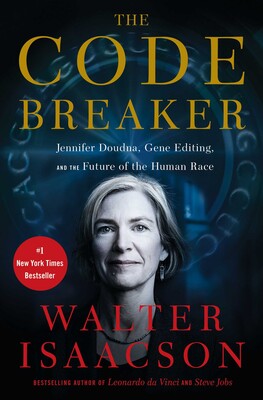What Is It to Be Human Anymore?
By Michael Hirsh,
Foreign Policy
| 04. 02. 2021
This book is not for the faint of mind. Walter Isaacson is a great storyteller who has devoted his justly acclaimed career as a biographer to such history-changing individuals as Albert Einstein, Steve Jobs, Henry Kissinger, and Leonardo da Vinci. Now, in his new book The Code-Breaker: Jennifer Doudna, Gene Editing, and the Future of the Human Race, he tries to do the same with Jennifer Doudna, the engaging and brilliant University of California, Berkeley scientist who shared the 2020 Nobel Prize in chemistry with her French collaborator Emmanuelle Charpentier for discovering the inner workings of gene editing. Supported by a cast of eager and intensely competitive scientists who spanned the globe from Spain to China, Doudna and Charpentier figured out how to not only make human gene editing relatively simple but also turn it into what is, simultaneously, a hope-giving and terrifying technology.
As is typical for his work, Isaacson has done prodigious research—even learning to gene-edit himself. But perhaps his biggest challenge was that it may be easier to explain the achievements of da Vinci or even...
Related Articles
Flag of South Africa; design by Frederick Brownell,
image by WikimediaCommons users.
Public domain, via Wikimedia Commons
What is the legal status of heritable human genome editing (HHGE)? In 2020, a comprehensive policy analysis by Baylis, Darnovsky, Hasson, and Krahn documented that more than 70 countries and an international treaty prohibit it, and that no country explicitly permits it. Policies in some countries were non-existent, ambiguous, or subject to possible amendment, but the general rule remained, even after one...
By Tamsin Metelerkamp, Daily Maverick | 11.18.2024
The National Health Research Ethics Council (NHREC) has confirmed that heritable human genome editing (HHGE) remains illegal in South Africa, after changes in the latest version of the South African Ethics in Health Research Guidelines sparked concern among researchers that...
By Bernice Lottering, Gene Online | 11.08.2024
South Africa’s updated health-research ethics guidelines, which now include heritable human genome editing, have sparked concern among scientists. The revisions, made in May but only recently gaining attention, outline protocols for modifying genetic material in sperm, eggs, or embryos—changes...
By Jantina de Vries, EthicsLab | 11.15.2024
The conversation around human heritable genome editing (HHGE) in South Africa is marked by controversy and conflicting interpretations of the law. At the center of this debate lies a team of lawyers based at a South African university, who have...




